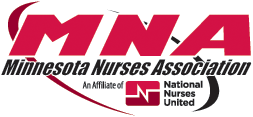For Immediate Release
(o) 651-414-2863
(c) 612-741-0662
rick.fuentes@mnnurses.org
Barbara Brady
(o) 651-414-2849
(c) 651-202-0845
barbara.brady@mnnurses.org
“When hospitals seek to increase their bottom line, patients suffer the consequences,” said Carrie Mortrud, a registered nurse and co-author of the report. “Inadequate nurse staffing increases patient risk of harm; longer hospital stays; medication errors; injuries; increased durations and types of infections; and even death,” Mortrud said.
Registered nurses file Concern for Safe Staffing (CFSS) reports when they feel their patients suffered because of short staffing. CFSS reports go to MNA, the facility, and state officials, as the nurse designates. Each year, MNA analyzes those reports for trends, frequencies, and consequences of short staffing. In 2017, nurses filed 3,048 CFSS reports, which is up slightly over 2016 when nurses filed 3,000.
“Short staffing is a common practice across Minnesota hospitals, and the effects explained in this report show this is an epidemic with no foreseeable end,” said Jackie Russell, registered nurse, attorney, and co-author of the report.
Rising trends in short staffing consequences included nurses unable to take an assignment because of patient safety (+49.73 percent); hospital units closed to incoming patients due to staffing (+5.94 percent); and unqualified staff forced to work in a hospital area where they were unfamiliar (+2.56 percent).
Some patient effects saw decreases in the reports, including patient falls or imminent patient risk (-14.29 percent); patients leaving the facility Against Medical Advice (AMA) without being seen due to short staffing (-10.36 percent); and patients delayed in receiving their medications (-3.4 percent).
Nurses have been filing CFSS forms since the early 1990s. However, despite the CFSS forms being seen by their supervisors, nurses also reported that hospital managers continued to be unresponsive to their pleas for more help. The MNA report cites 2,372 incidents of short staffing situations in 2017 when management was made aware yet offered no response or help, which is up 1.58 percent over calendar year 2016.
“Nurses’ demands consistently fall on deaf ears,” Mortrud said. “Over the past four years, management and administration’s pure disregard for help when a shift is short staffed has been the most frequently reported problem. Those responsible for staffing decisions have shown they are not reasonable, responsible, or concerned by bedside nurses’ reports.”
The 2017 MNA Concern for Safe Staffing Report is available in print or download from the MNA website. The link is: https://mnnurses.org/wp-content/uploads/2018/07/2017-CFSS-Report-Final.pdf

